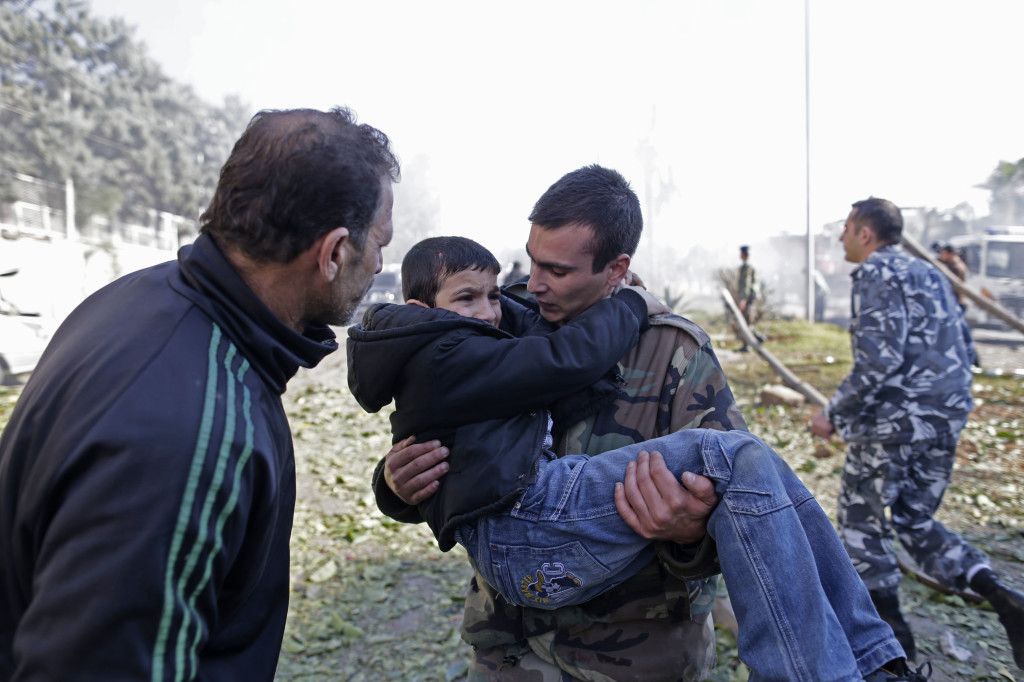This March marks three years of bloody civil war in Syria. The broken bridge between the people and the government has yet to be fixed, and the displaced refugees have still not gone home. The U.S. stands just outside what has become a complex political battle. As students at Seattle University, some find it difficult to know what to do. A panel earlier this year at City Hall addressed the revolution in Syria. According to the panelists, one good step is trying to understand the situation. It’s important to understand that it’s going to be a long haul situation with no immediate fixes, speakers said. Even so, they added, it’s not hopeless. A good thing for Americans to do is stay informed.

A Lebanese soldier carries an injured boy away from the site of a car bomb explosion in the suburb of Beir Hassan, Beirut, Lebanon, Wednesday, Feb. 19, 2014. The bombing in a Shiite district in southern Beirut killed several people on Wednesday, security officials said â?? the latest apparent attack linked to the civil war in neighboring Syria that has killed and wounded scores of people over the last few months. (AP Photo/Hassan Ammar)
Seattle U sophomore Katie Hogan said that she gets all of her news on the Syrian conflict from Skimm, a news source that sends her email updates. Sophomore Allison Meyers cited SourceFed and Philip DeFranco as being reliable places to get information “I get all my news from these two Youtube channels,” she said. Even so, it can be hard to learn all the facets of a complex situation.The Spectator wanted to provide a
breakdown of what has been happening. According to BBC, the fighting first broke out in March of 2011. Syria has an authoritarian government, wherein Bashar al-Assad has maintained his position as president throughout the civil war. Peaceful protests began after students were jailed and supposedly tortured for doing critical graffiti messages aimed at the government. Organizers were protesting for increased freedom of expression in defense of the students. The governmental response to these protests was violent, spurring an ongoing battle between the government and those who became known as the rebels. But even the rebel forces are by no means united in Syria. There are many small factions within the government resistance movement. The largest and most prominent is called the Free Syrian Army, who is still significantly smaller and less equipped than the government. These forces are ultimately fighting for freedom but now with the added focus of removing al-Bashar from office. It is important to note that not everyone in Syria opposes the government. Al-Assad still has many supporters among the Syrian people. But all are experiencing the effects and discontent of the civil war. According to a recent Huffington Post blog by Wendy Pearlman, assistant professor of political science at Northwestern University. “Every day, Syrian children are struck dead, have limbs blown off, shiver in freezing refugee camps, or starve. Bombs fall from the sky, political prisoners become skeletons, and families survive on boiled grass. World heritage sites turn to rubble and polio spreads.” Though the conflict in Syria has attracted the attention of many world powers, the U.S. and many other countries continue to stand by the wayside. The rebels and the Syrian government are more or less at a stalemate—neither side is able to get the upper hand. According to BBC, the U.S. could be reluctant to get involved in the Syrian conflict because that could also mean engaging with Russia, an ally of Syria. Additionally, the U.S. doesn’t want another prolonged presence in a middle eastern country. “What is certain is that the option least likely to end the Syrian nightmare is continuation of the Syrian nightmare,” wrote Pearlman. The United Nations has recently passed a resolution saying that the Assad government cannot interfere with the provision of humanitarian aid to the millions of Syrians who need it. The resolution was even signed by Syria’s ally Russia, sending a strong message to the Syrian government. Secretary of State John Kerry says that this resolution could be a possible turning point if implemented correctly. The Syrian Civil War is part of a movement called the Arab Spring, wherein since 2010, many Middle Eastern countries have begun revolutions against the government resulting in inter-country warfare. Many civilians have been displaced, both into refugee camps and other countries. Syria is bordered by the Mediterranean Sea, Lebanon, Jordan, Iraq and Turkey, as well as a little bit of Israel and Palestinian territories. Simply escaping to a new country doesn’t solve the problem. According to Cassandra Nelson of Mercy Corps, one of the panelists from Town Hall, Syria’s bordering countries have many of their own problems meaning it is difficult to additionally care for refugees. Seattle Town Hall’s October panel on the Syrian conflict included not only Nelson from Mercy Corps, but also Director of the Jackson School at the University of Washington Resat Kasaba and influential Turkish journalist Çengiz Candar. The panel added that Americans can advocate and write to Congress. To conclude the evening, they advised Americans to remember that the United States arrived at its strength by holding onto justice. Their final advice: uphold justice always.








